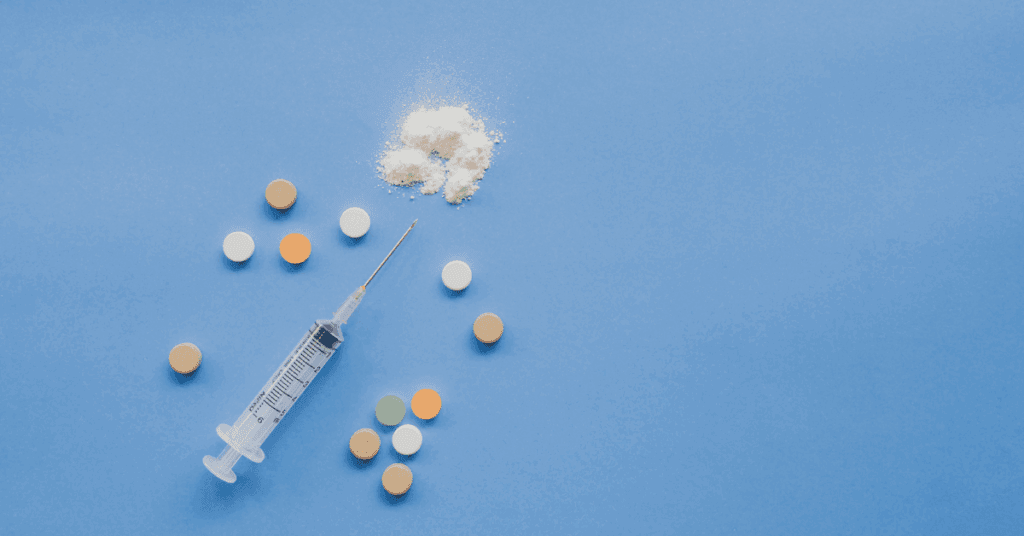What changes in the brain during addiction
Addiction rewires the brain in ways most people don’t realise. When someone starts using a drug regularly, their brain begins to rely on it to release feel-good chemicals. The part of the brain responsible for pleasure and reward starts to treat the substance like a survival need. This means that after enough exposure, the drug stops being optional—it becomes something the brain demands.

The reward system, mainly involving dopamine, gets overstimulated. At first, this creates intense highs. But over time, the same dose no longer brings the same feeling. The brain adapts, and this leads to tolerance. So, the person takes more just to feel normal. The part of the brain responsible for making decisions and controlling behaviour (the prefrontal cortex) weakens, while the part that chases rewards becomes dominant. This makes it incredibly difficult to stop, even when someone knows it’s hurting them.
Even when drug use ends, the changes in the brain don’t immediately reverse. Cravings can remain for months, sometimes years. Everyday situations can trigger urges without warning. These are not signs of weak willpower. They are the results of chemical patterns that were learned and reinforced over time. Recovery is not just about stopping the substance—it’s about slowly retraining the brain to feel without it.
Emotional instability and unpredictable moods
People often think addiction is only about the physical act of taking a substance. But it’s more than that. Emotional control becomes one of the first casualties. Someone who once handled stress or disappointment in healthy ways starts reacting with either emotional numbness or sudden outbursts. Moods swing between high and low with little warning, often confusing both the person using and those around them.
These emotional shifts aren’t always connected to what’s happening externally. They come from within, as the brain struggles to manage its chemical balance. Someone may wake up in tears with no clear reason or find themselves yelling at a loved one over something small. This makes it hard to maintain relationships, hold down work, or even trust one’s own reactions.
Over time, the emotional toll builds up. The constant inner chaos makes people avoid others. They might feel unsafe in their own skin and begin to fear their own emotions. This withdrawal from others leads to further isolation, which worsens the mental health strain. It’s a cycle that doesn’t break on its own.
Depression, anxiety, and the mental crash
Once the drug wears off, a different kind of struggle begins. Depression and anxiety hit hard. These aren’t just low moods—they are full-body states of unease and despair that can make getting out of bed feel impossible. The brain’s chemical system, which once regulated mood and energy naturally, now relies on the drug to function. When that’s removed, everything crashes.
Anxiety can show up in small, constant ways or in sudden panic attacks. A person might feel on edge for no reason, always expecting something bad to happen. Depression, on the other hand, flattens everything. Things that used to bring joy feel empty. There’s no motivation, no hope, and no point. These feelings aren’t caused by life circumstances—they’re created by chemical imbalances that have been building for a long time.
Even when the drug is gone, these symptoms can last. That’s what makes recovery so difficult. The person may look better on the outside but feel worse inside than they did while using. This can lead to relapse, not because they want to get high again, but because they’re desperate to escape the mental crash that follows sobriety.
Loss of identity and self-worth
Drug addiction slowly strips away a person’s sense of who they are. What once defined them—interests, values, goals—fades away. In its place is the single focus of getting and using the substance. Over time, people forget who they used to be, and that confusion becomes a major part of the psychological struggle.
This identity loss affects more than just how a person sees themselves. It affects how they relate to others. They may pull away from friends and family because they no longer feel like they belong. They may avoid responsibilities because they don’t believe they can handle them. Every missed event, broken promise, or failed goal chips away at their self-worth.
The shame that follows deepens the problem. Someone might look in the mirror and not recognise themselves. They feel like a burden, a disappointment, or a failure. This loss of self-belief makes it harder to ask for help and harder still to accept it. Without a strong sense of identity, it’s difficult to fight for a better future.
Memory, attention, and long-term cognitive damage
Drugs don’t only affect how a person feels—they also affect how a person thinks. Long-term use can impact memory, attention, and the ability to solve problems. Someone may forget conversations, lose track of time, or find it difficult to stay focused on simple tasks. These aren’t minor annoyances. They change how a person functions every day.
The brain’s ability to process new information slows down. Tasks that used to feel easy now take more time and effort. For some, it may feel like living in a fog. Conversations become harder to follow. Reading or writing becomes a struggle. These changes are especially tough because they aren’t always visible to others, but they affect nearly every part of life.
In some cases, the damage is long-lasting. Even after stopping drug use, some people continue to deal with slower thinking and weaker memory. This can make it harder to find work, rebuild trust, or continue with education. The mental slowdown becomes a barrier, not just to recovery, but to returning to life as it once was.
How relationships break down
Relationships suffer badly when addiction enters the picture. Trust is one of the first things to go. Lies, broken promises, and strange behaviour wear people down. Partners, parents, and friends often don’t know how to help, and over time, they stop trying. This leaves the person with fewer support systems at the exact moment they need them most.
The emotional distance grows. The person using may isolate themselves out of guilt or shame. They may lash out in anger or become emotionally distant. Small arguments become big ones. Important moments get missed. Relationships that once felt safe start to feel tense and fragile. Even those who want to help can feel pushed away.
The breakdown of these connections adds to the psychological burden. It reinforces the belief that the person is alone or beyond help. It creates a mindset where rebuilding relationships feels too difficult. And without these bonds, the chances of recovery go down. Rebuilding trust is slow, and for many, the damage runs deep.
Cravings, denial, and the mental war
Even after someone stops using, the cravings don’t always stop. Cravings aren’t just physical—they are mental. They come in strong, unpredictable waves and take over thought patterns. Someone can go from feeling strong to feeling overwhelmed by the urge to use, all within minutes. This isn’t about poor decision-making. It’s a mental war that wears people down.
Denial adds another layer to this struggle. Many people convince themselves they don’t have a problem or that they can control it. This is partly defence and partly survival. Admitting there’s a problem means facing the fear of change, and that can feel scarier than staying where they are. The mind starts creating excuses, justifications, and distractions to avoid facing reality.
This cycle of craving and denial can repeat endlessly. The person might stop, then go back. They might make promises, then break them. Each time, they feel worse about themselves. And each time, the mental fight becomes harder to win. It’s not just about quitting the drug. It’s about gaining control of a mind that has learned to lie to itself.
Isolation, shame, and withdrawal from society
Addiction thrives in isolation. As the behaviour becomes more secretive, the person pulls further away from others. Phone calls go unanswered. Invitations are declined. Time once spent with others is now spent alone, often hiding or recovering. This isn’t always a conscious choice. It’s often driven by shame.
Shame is powerful. It makes people believe they’re not worth helping. It makes them hide their pain, even when they desperately need support. They don’t want to be judged, so they cut people out before anyone has the chance. Over time, this creates a lonely world where the only constant is the drug.
Society often makes this worse. The stigma attached to addiction pushes people further into the shadows. They feel like outcasts. Even when help is offered, they may feel they don’t deserve it. That’s why many people stay stuck—not because they want to be, but because shame has told them they have nowhere else to go.
Fear of relapse and the long shadow of recovery
Even after someone stops using, the fear of relapse stays. This fear isn’t irrational. It’s based on experience. Many people have quit and gone back. They’ve felt hopeful, only to fall again. That fear becomes a constant voice in the back of their mind, telling them they’ll never truly escape.
This fear can create a trap. The person becomes afraid to try in case they fail. They avoid situations, people, or even support groups because they don’t want to risk another fall. Instead of building confidence, they stay frozen. The fear becomes stronger than the drive to recover.
What makes it worse is that relapse is often seen as failure. But it’s not. It’s part of the process for many people. Still, the guilt and shame after relapse can be intense. It resets the emotional struggle and deepens the belief that recovery isn’t possible. This long shadow follows many people long after the substance is gone.
How addiction rewires values and priorities
At its peak, addiction shifts what matters to a person. Things that used to matter—family, work, health—become background noise. The drug takes centre stage. The person starts making choices based on short-term relief, not long-term goals. Over time, this shift becomes so normal that they don’t even see it happening.
This change in values affects everything. Money that was once saved is spent without thought. Time that was once structured becomes chaotic. Goals are abandoned. Plans are forgotten. The person may even act against their own morals just to keep the habit going. The drug becomes the only priority.
When someone starts recovery, they often feel lost. They have to rebuild their internal compass from scratch. They have to figure out what matters again. This isn’t easy, and it takes time. But without this shift back to real values, recovery doesn’t stick. The brain might stop needing the drug, but the mind still has to learn what it means to care again.

